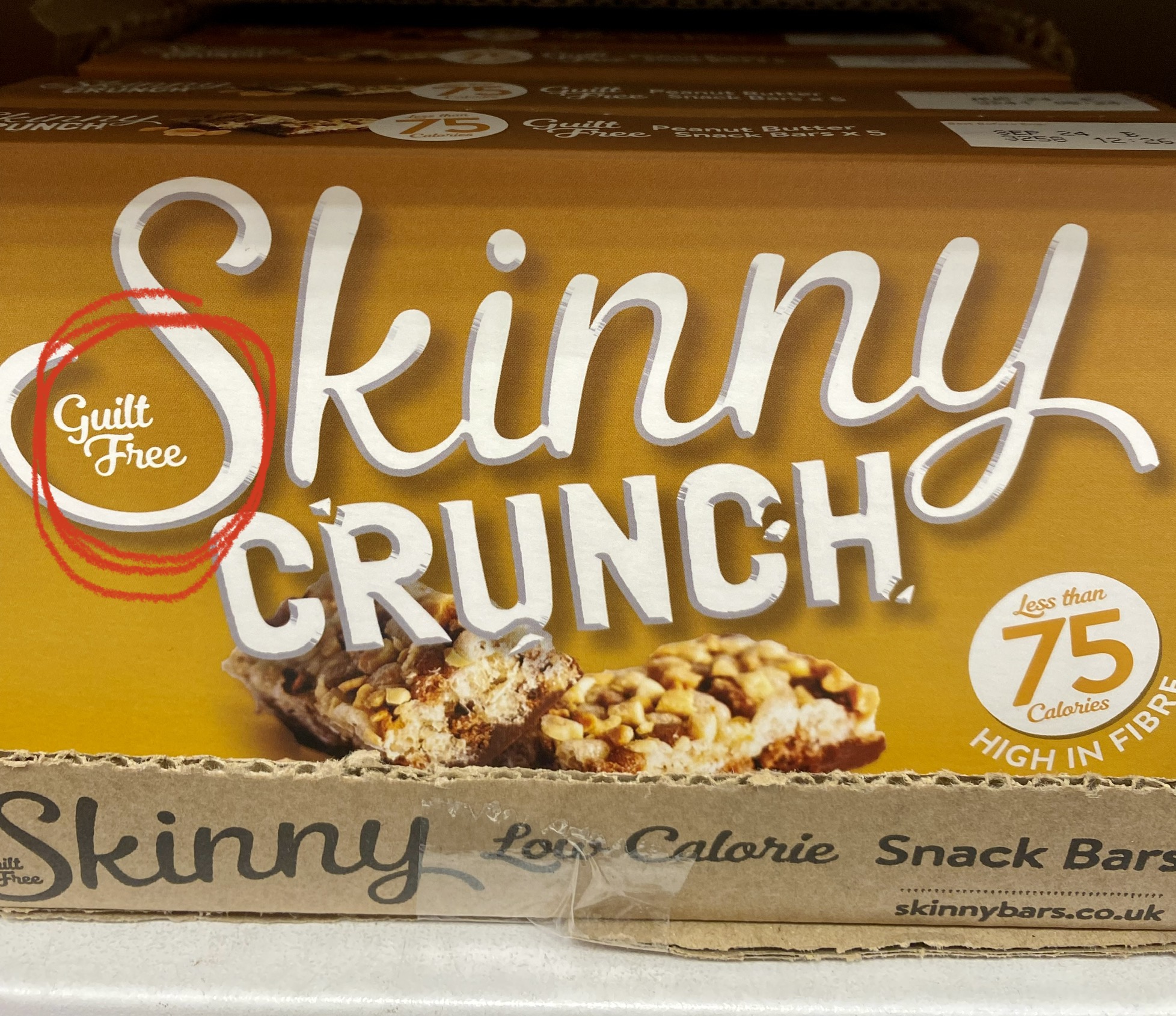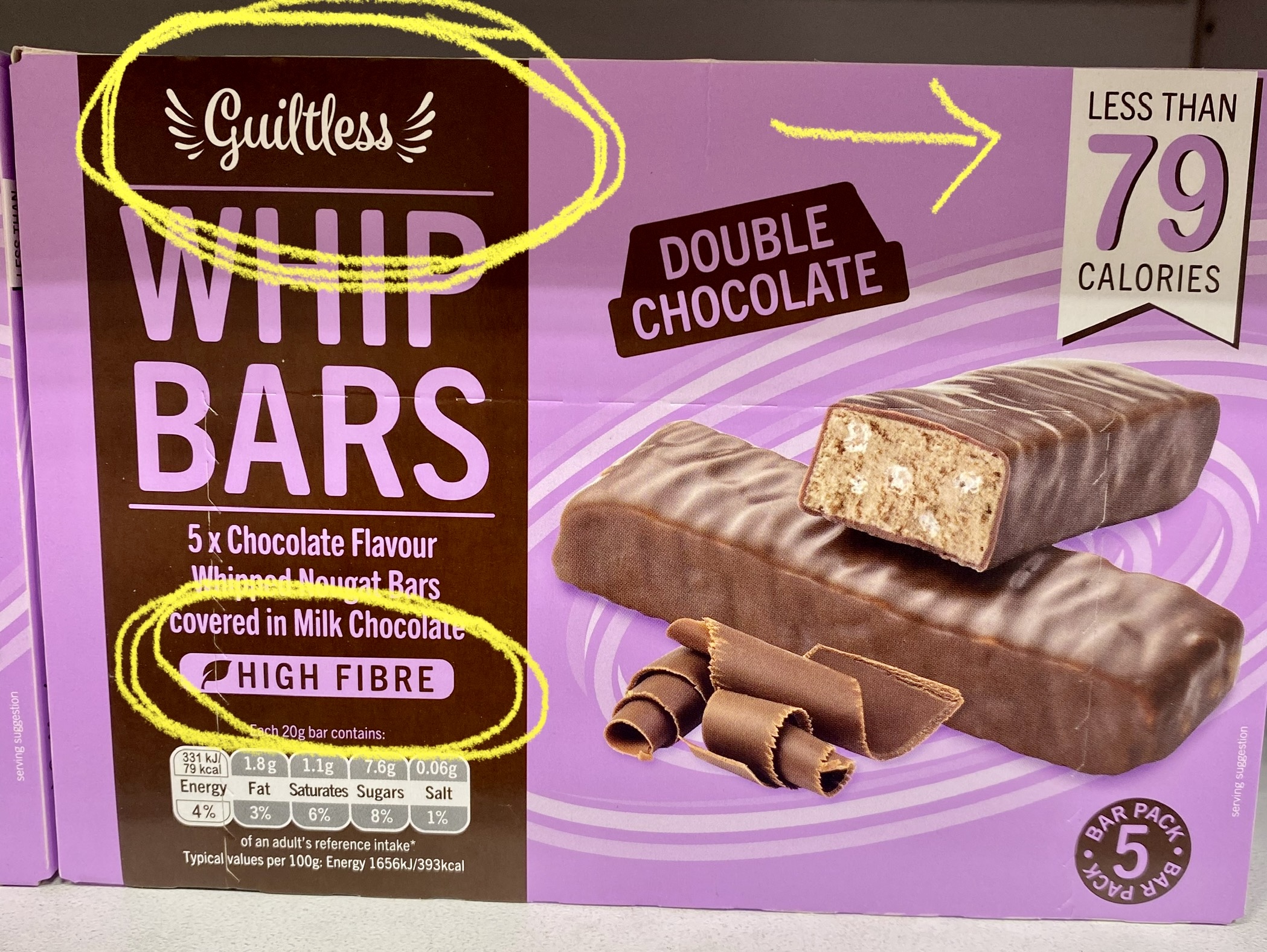

Browsing the aisles of a discount chain store at the weekend, these products stopped me in my tracks – and not because I was adding them to my basket.
My reaction to these miserable offerings was visceral and immediate. They might just be a cheap little snack bar, but what they represent and the way they are being sold represents so much about diet culture and the damage it can cause.
What’s so bad about them?
In themselves, nothing.
Yes, they are highly processed with limited nutritional value (although at least “High in Fibre” is something), but so are lots of things and they don’t prompt me to write a blog about them.
They are also convenient. Pop them in your bag or keep them in the car, so whenever you get peckish, they’re an alternative to a Big Mac.
No, it’s the principle and the packaging that brought out the keyboard warrior in me. I’ll explain…
“Girly” colours and frilly typeface?
Yep, there’s no doubt these are for the ladies, like the snack equivalent of the pastel-drenched cover of a “chick-lit” novel (that’s a rant for another day).
Shouting loudly about their tiny calorie content?
Certainly. They want the buyer to assume that low calorie is best, regardless of quality, taste or what’s in it. Or more likely, to encourage us to eat more of them because at only 79 calories each, why not? Well, for a start because they will be extraordinarily unsatisfying, meaning the unsuspecting dieter (at whom they are clearly aimed) will probably need all 5 to feel anything. By the time you’ve had the whole box, you could have used those 400kcal on something fabulous instead.
The name itself is hugely problematic. “Skinny” can’t refer to the bar itself, that doesn’t make any sense. So it must be there referencing a lifestyle, a goal, a good thing. Of course we are all different shapes and sizes, which is a wonderful thing, and being very slim is just one body type on a vast spectrum. But if “skinny” isn’t your default setting, branding like this suggests that it should be and that these bars will help you get there.
“Skinny” isn’t even a nice word. Unlike its more positive cousins “slim”, “svelte”, “lean”, it can have connotations of scrawny, malnourished, under-fed, weak. Is that really what we aspire to be? It’s also a largely female-focused word. A man outwardly expressing a desire to be “skinny” is unusual, and something that (perhaps rightly) would ring the alarm bells of disordered eating (although I appreciate that a quest for “leanness” is the more socially acceptable, similarly harmful modern equivalent); for many women, “skinny” as a life goal is common and often encouraged. That said, due to changing “trends” in female body shapes (have you ever read a more ridiculous phrase?), skinny is less sought-after in women younger than me, who may now be chasing a new yet equally arbitrary ideal.
I’ve had periods of being skinny, and all of those other negative adjectives applied. Whether it was unintentional (the divorce diet) or deliberate, it was neither fun getting there nor being there, and in the latter case, always came from a place of self-loathing and distorted body image, a desire to “take up less space” or fit some twisted ideal that didn’t match my own shape.
However, it’s not even the lazy name of the bar that made me take the photos.
It’s the proud proclamation that these snacks are “guilt free”, just as other products might display their nut-free, gluten-free, meat-free credentials.
Guilt is not an ingredient.
If these miserable bars are guilt free, why not also say that they are joy-free, taste-free, real-food-free? What guilt should we feel about eating anything? If we are meant to eat these without guilt, does that imply that any foods not labelled the same way are guilt-full?
Food does not come with guilt or shame attached. That is something we have been made to feel by those same clever types who made us believe that cream cakes are “naughty” or that there is virtue in eating poor-quality Skinny snack bars.
All foods have a nutritional content: you’ll have noticed that “guilt” isn’t listed on the back with the carbs, fats and protein, BECAUSE IT’S NOT A THING.
I spent years eating in secret; had times where I wouldn’t eat in front of my husband in case he thought I was greedy; felt that I had to earn calories through exercise; been mortified by well-meaning relatives saying “ooh you eat well, don’t you?” because I knew what they meant… I know what food guilt feels like, which is why any product that perpetuates this damaging nonsense really hits a nerve.
We all deserve to eat.
Ideally, we eat a diet that supports our health, tastes great and makes us feel good, whatever our gender, shape, size or weight. But whatever we choose, let’s leave the guilt in the cupboard, or even better, throw it out. There’s no room for that in anyone’s kitchen.